 | Written and Researched by Margaret Odrowaz-Sypniewska, Bachelor of Fine Arts 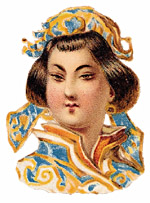 |
Cars were burned in the streets and a young professor, from Princeton University, named Robert Karl Reischauer, along with an Australian barmaid called "Dodo Dynamite" were killed in the entrance of the Palace Hotel. Two bombs were accidently released at the corner of Avenue Edouard VII and Tibet Road. This bomb killed 1,011.00 Chinese and foreigners and injured 570. This was the worst civilian carnage, in a single day, anywhere in the world up to this time. About 350,000 refuges tried to leave Shanghai for villages in the hinterland.
1931 - A Chinese cholera epidemic kills 32,000 people.
December 17, 1932, Alexander Malcolm writes a letter to Constance, in England, after his return from Chungking and Hankow, where he traveled by a private airplane. He mentions his friend Mr, Lu, Mr. Chang, Mr Groves, and a Rev. Jones staying at the Canadian Mission Hotel. Alexander was there inspecting the Ling Sung Engineering Works. They then stayed in the Hot Springs Hotel. He mentions Huchew where "800 Chinese troops are getting ready to go to war near Chungtu (about 150 miles away)."
Alexander meets the manager of the Bank China, and the Commissioner of Customs back in Chungking. He then arrived back at Hankow. His purpose for this trip was that Malcolm & Company were building a hydro-electric scheme, a coal conveyor, a machinery plant, and a lighting plant there.
December 25, 1932 - Kansu, China, has its third earthquake in 12 years and 70,000 are killed.
March 1, 1934 - Japanese appoint former Chinese Emperor, Pu-yi, as its puppet Emperor of Manchuria.
1934 - Constance Malcolm is in England for Easter. Alexander is still in Shanghai trying to close up business affairs, and his company.
Malcolm & Company Canton Waterworks Project is bombed with only 3 weeks left before its completion. A sad event, after all his hard work.
Alexander Malcolm is still in Shanghai from 1937-1939.
October 23, 1935 - Munitions dump explodes in Shanghai, killing 190 citizens.
1936 - Severe drought in China's western regions results in 5 million dying of famine.
November 25, 1936 - Chinese Nationals and Communists join forces against the Japanese.
July 7, 1937 - War breaks out between China and Japan. The Japanese capture Shanghai and Peking. They occupy Shanghai from 1937-1945.
Five thousand (5,000) British and Americans boarded evacuation ships in the weeks that followed August 14, 1937. The threat of Japanese occupation in Shanghai resulted in shipping Shanghai silver out to Hong Kong and its trading was managed from safer ports.
The Japanese made a victory parade down Nanking Road on December 3, 1937. The International Settlement was in the middle of a major conflict. The Palace Hotel replaced its shattered glass and reopened the bar room. Businessmen played tennis outside again and crowds were going to the Grand Theater to see Luise Rainer in The Good Earth.
Constance Malcolm has 1,000 British pounds from the last check sent to her in England from their Chinese bank in Shanghai. The Malcolm children are now all teenagers.
All establishments were having record business as Shanghai was living each day as it was their last. In July 1940, businessman and journalists were being terrorized. Americans were evacuating women from China, only a few stayed after 1937. Most offices were transferred to Hong Kong or Manila. However, many British families remained in spite of warnings from their consulate. Some remained because they preferred the easy life in the Orient with numerous servants, something they could never afford in England, France, or the U.S.A.
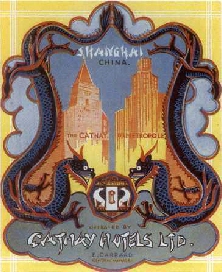 ...
... 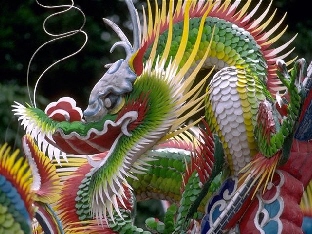
The Year of the Dragon is a dramatic year; this is a time to think big. The more spectacular, the more unusual, and the more bizarre, the better chance for success. With an undercurrent of luck and feel-good factor sweeping throught the year. The year of the dragon is favorable for marriage, for starting a new business or launching a brand new ideas.
It is thought that Alexander Malcolm fled Shanghai, in 1940, and went to Singapore.
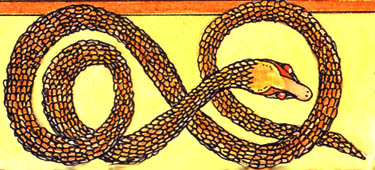
This year all sorts of indiscretions will come to light. This is a year of political intrigue ans improper dealings. Reading the small print is essential as duplicity seems to be rife in this year. Morality issues will be raised.
July 26, 1941 - U.S. halts trade with Japan.
December 7, 1941 - the Japanese bomb Pearl Harbor.
December 8, 1941 - Japan's conquest of Malaya is launched. Alexander has three branches of his business there. The British think that Singapore's location and fortification makes it safe, however, history tells otherwise.
December 8, 1941, marked another attack. Both the British gunboat Petrel and the U.S.A.'s Wake were burning in Shanghai harbor. The Shanghai Club has been captured by the Japanese. British domination of Shanghai has ended.
A year later, foreigners are given arm bands to wear. "B" for British; "N" for Netherlands, and "A" for Americans.
The Japanese freeze all bank accounts. Foreigners are allowed to draw only 2,000 Chinese dollars a month, and the bank was only open two hours each day.
2,000 Chinese dollars were about what a lower-class Chinese family made. Foreigners no longer had servants, could not afford wood or coal for heating and had to eat rice, fish, and cabbage. The Japanese confiscated their cars, so they now had to ride bicycles, take trains, or buses. They could no longer afford ricksha rides.
The Japanese took all foreign businesses or seized their assets. Their business bank accounts were drained as well.
December 25, 1941 - Hong Kong surrenders to Japan.
Trading is brisk and emotions volatile in this fast-paced and exciting year. Fluctuating fortunes, both on a global and personal level, can be expected with spending and borrowing running out of control.
- Constance Malcolm gets word, in England, that she is cut-off from all financial support, when their business account is taken into Japanese hands.
February 15, 1942 - Singapore surrenders to the Japanese.
The Bridge House (an eight-story apartment) was converted to cells and torture chambers. Once arrested, prisoners are made to wear a cotton gown and trousers. Men, women, foreigners, and Chinese are crowded together. Rats and lice are everywhere and no one is allowed to bathe or shower. Dysentary, typhus, and leprosy run rampant. There was only one bucket in the corner for people to to relieve themselves. One meal of rice, stale bread, and weak tea was served at midday.
Prisoners were interrogated and tortured. When questioning began, they had to remove all their clothes and kneel before their captors. When their answers didn't satify their interrogators, the victims were beaten, on the backs and legs, with four-foot bamboo sticks until the skin was broken and bleeding occured. Bamboo slivers or metal spikes were forced under the victim's nails. Water torture was another favorite. In this case, victims were lashed to a bench and a towel was wrapped in a circle around their nose and mouth. Filthy water was poured down their nose and mouth, or water was poured into the victim's nostrils through bamboo pipes. When they seemed to be losing consciousness, a second man jumped up and down on the victim's stomach. Then they were tied, by their ankles, from the ceiling so that the water drained out. Some men had skin burned off their private parts with cigarettes or electrical devices. Some died and others are let go on the idea that they tell no one about their experience. Some wanted to commit suicide, but were too weak to do so.

A progressive, upbeat swing usually accompanies the Year of the Monkey, with communications high on the agenda. But to succeed at this time, it is essential to keep one's wits well honed since a good deal of chicanery abounds. Nothing in the Monkey year is straightfrward, so plans must be double-checked and extra insurances taken out for good measure.
July 1944, American aircraft appears over Shanghai. By November, major air raids began. The Americans had been bombed, at Pearl Harbor, on December 7, 1941, so they had a score to settle with the Japanese.
Fashion is big in Rooster years when image is of the essence. In Politics, the downtrodden make themselves heard and economically, measures are taken to insure that financial institutions run more efficiently.
By July 1945, Americans Boering B-29s were heard everyday. The United States of America has been based on Okinawa, since June 21, 1945. The Japanese refused to surrender. Their war minister, Koreichi Aname, vowed they would fight to the end. The Japanese themselves were stationed near Hongkew.
1945-1946 - Cholera strikes China again.
Famous dates in August 1945:
(1) August 6, 1945 atom bomb dropped on Hiroshima, Japan, by American B-29 bomber.
World War II kills an estimated 50 million, while 34 million are wounded.
Neither the Red Cross nor the Colonial Offices can obtain any information about the disappearance of Alexander Malcolm. It is rumored that he was sent out of Shanghai to Singapore. However, his safety there was not long lasting and after the Naval Base was being evacuated by the British, just before the fall of Singapore (February 15, 1942), it was first thought that Alexander boarded the Aquarius. The Aquarius sunk without survivors off the coast of Sumatra. For more on this CLICK HERE
The Colonial Office issues a certificate of Alexander's presumed death, on February 13, 1945.
However, later in 2002, I discovered that the SS Redang was the ship that Alexander died on. This happened between February 13-15th, 1942, when Japanese fire sunk the ship within 5 miles of the Berhala Straits.
(2) August 9, 1945 atom bomb dropped on Nagasaki, Japan, on the island Kyushu. This bomb is dropped by the Allies, killing and wounding 75,000 people..
(3) August 14, 1945 Japan surrenders.
 Mao Tse-tung in 1938 - Communist Leader. .....
| 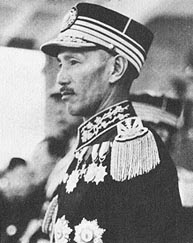 Chiang Kai-shek, November 1926 |
During the eight years of Japan's war with China (1937-1945), an estimated 15 million Chinese died, and starvation and pestilence threatened the living. Struggles between the Nationist government of Chiang Kai-Shek and China's Communists, led by Mao Tse-tung, had made matters worse. From 1945-1949 there was a Chinese civil war. On October 1, 1949, Mao Tse-tung appeared outside the gates of the Forbidden City and declared victory as The People's Republic of China. From this day forward, the Communist rule in China.
September 8, 1951 - Japan signs a Peace Treaty in San Francisco, California, U.S.A., and on April 28, 1952, American occupation of Japan is concluded. 1952 is the Year of the Dragon.
Related Links:
Tales of Old China ***an excellent site with information about life in Old Shanghai
Auchtermuchty, Fifeshire, Scotland|The Malcolm Family |The Malcolm Family Tree |Alexander Malcolm
The Opium Monopoly - Shanghai ... Chapter 8 - Shanghai (1931-1941)
Sources:
Dong, Stella. Shanghai 1842-1949: The Rise and Fall of a Decadent City. New York: William Morrow, 2000.
Elson, Robert T. Prelude to War (World War II). Alexandria, VA.: Time-Life Books, 1995.
Sevareid, Eric. WWII New York: Time-Life Books, Inc., 1989.
Sulzberger, C.L. The American Heritage Picture History of World War II. New York: American Heritage Publishing Co., Inc., 1966.
Wetterau, Bruce. The New York Public Library Book of Chronologies. A Stonesong Press Book, 1990.
Home
Email Margaret: Margaret
This page was last updated on May 26, 2000
